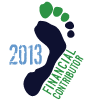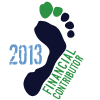Barefoot TJ wrote:What about
I've been thinking about this during my run today. There is a lot to say for the run/walk method (Galloway or other) if one wants to improve time at a race without a high risk of injury. Switching back and forth between walking and running allows muscles to rest but still gives one the feeling of running, at least until the air supply runs out.
I used a walk/run method for my second half-marathon which was a more technical trail run with elevation changes (Moscow Mountain Madness) and much tougher than my first half-marathon on a flat road. I walked all the steeper uphill sections and was able to finish. I'm not sure that the walk/run method helped me get any faster nor am I sure it helped me develop more endurance.
In the end my primary purpose for running is not to run races but to improve my health in one way, in particular cardio-vascular fitness without hurting my health in another way (overuse injuries). This seems to be the first priority in Phil Maffetone's book as well.
The Maffetone method caps heart rate and thereby keeps effort almost the same regardless of whether I run uphill, downhill, into the wind, against the wind, on dirt, road, grass etc. This is what, according to Phil Maffetone's book, will improve the efficiency of my aerobic functioning. If Maffetone is right that most running is aerobic (any distances over 5 K for sure) this should be the best way to improve both endurance and speed over longer distances.
I could be switching between running and walking and even at the same speed, let's say 4 mph, I would get my heart rate up to about 115 walking but up to about 130 jogging. The purpose of jogging rather than walking is not to get there faster but to condition my body to use fat and oxygen better when running. I can only get better at running by running because walking uses different muscles. I also would not mind losing a couple of pounds of body fat in the process. Just today I read about a study that indicates that many people, especially middle-aged women, are likely to gain back weight that they lost but at the same time increase their percentage of body fat. I don't want to ever be in that group.
I'm willing to try this method for several more months because all I can lose is a couple of months. The potential benefits of a great aerobic base could last a life time and transfer to all other endurance activities that I'm doing, swimming, hiking, snowshoeing, horseback riding, hiking etc.
Better cardio-vascular fitness improves my quality of life significantly. Lots of different thoughts in one post, hope that all makes sense.
Barefoot TJ said:What about just doing the run/walk method? Won't you get the best of both worlds, burn fat and burn sugar?
I've been thinking about this during my run today. There is a lot to say for the run/walk method (Galloway or other) if one wants to improve time at a race without a high risk of injury. Switching back and forth between walking and running allows muscles to rest but still gives one the feeling of running, at least until the air supply runs out.
I used a walk/run method for my second half-marathon which was a more technical trail run with elevation changes (Moscow Mountain Madness) and much tougher than my first half-marathon on a flat road. I walked all the steeper uphill sections and was able to finish. I'm not sure that the walk/run method helped me get any faster nor am I sure it helped me develop more endurance.
In the end my primary purpose for running is not to run races but to improve my health in one way, in particular cardio-vascular fitness without hurting my health in another way (overuse injuries). This seems to be the first priority in Phil Maffetone's book as well.
The Maffetone method caps heart rate and thereby keeps effort almost the same regardless of whether I run uphill, downhill, into the wind, against the wind, on dirt, road, grass etc. This is what, according to Phil Maffetone's book, will improve the efficiency of my aerobic functioning. If Maffetone is right that most running is aerobic (any distances over 5 K for sure) this should be the best way to improve both endurance and speed over longer distances.
I could be switching between running and walking and even at the same speed, let's say 4 mph, I would get my heart rate up to about 115 walking but up to about 130 jogging. The purpose of jogging rather than walking is not to get there faster but to condition my body to use fat and oxygen better when running. I can only get better at running by running because walking uses different muscles. I also would not mind losing a couple of pounds of body fat in the process. Just today I read about a study that indicates that many people, especially middle-aged women, are likely to gain back weight that they lost but at the same time increase their percentage of body fat. I don't want to ever be in that group.
I'm willing to try this method for several more months because all I can lose is a couple of months. The potential benefits of a great aerobic base could last a life time and transfer to all other endurance activities that I'm doing, swimming, hiking, snowshoeing, horseback riding, hiking etc.
Better cardio-vascular fitness improves my quality of life significantly. Lots of different thoughts in one post, hope that all makes sense.



















